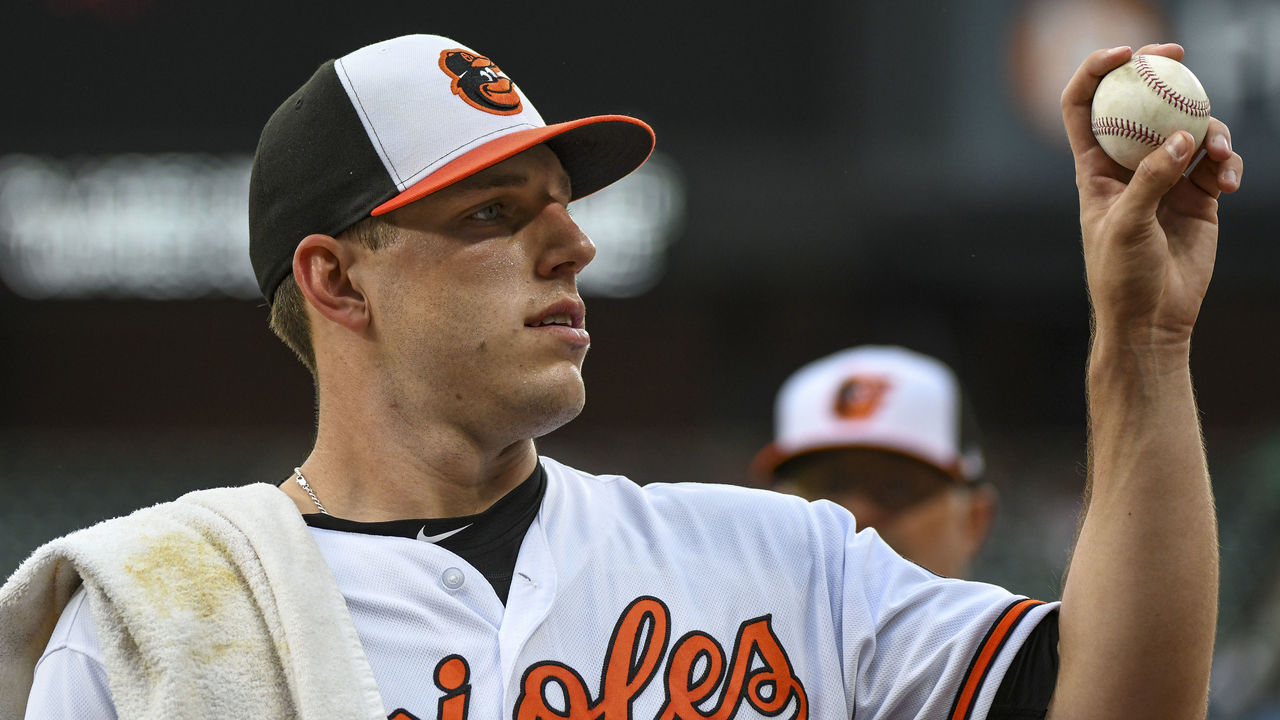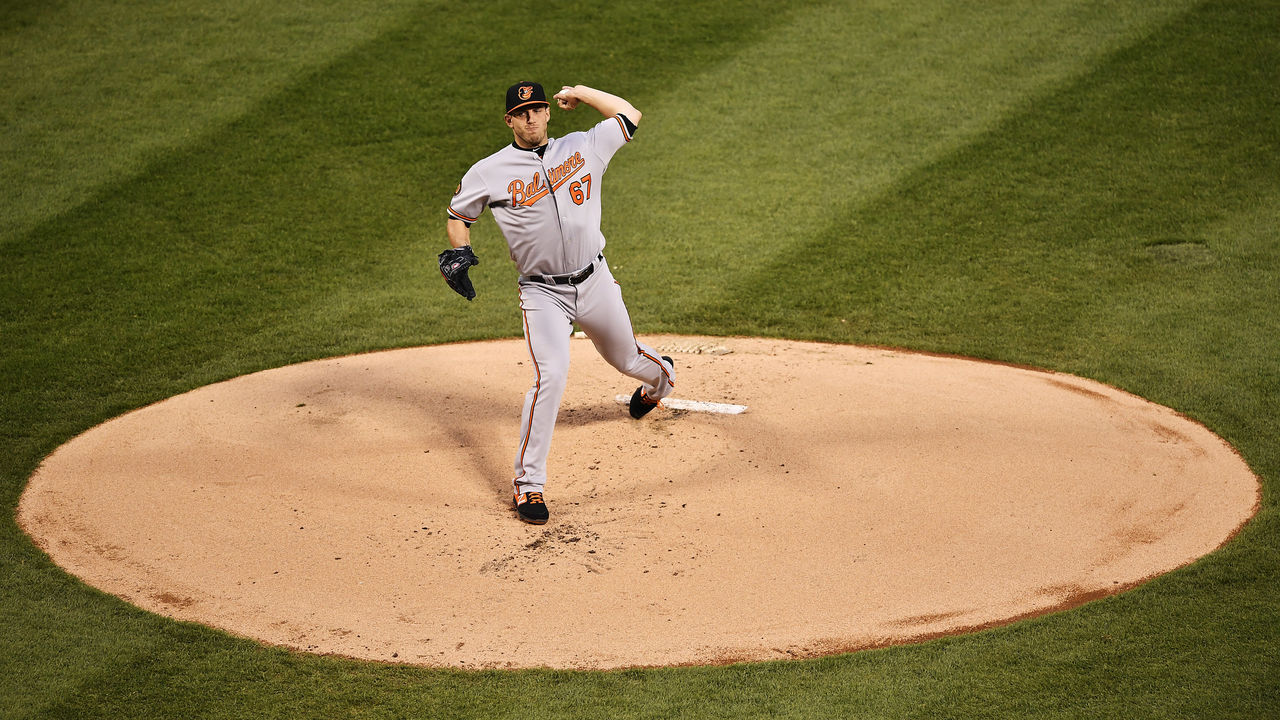'They might think I'm the clubbie': Meet John Means, the anonymous All-Star
John Means couldn't have imagined pitching in the 2019 All-Star Game. This past winter, he had a slightly more modest goal.
"Going into the offseason, I was just hoping not to get (designated for assignment)," Means admitted.
He wasn't, and now, he'll be suiting up for the Midsummer Classic.
Following a transformative winter during which Means overhauled both his mechanics and approach, the 26-year-old southpaw - a former 11th-round pick with underwhelming stuff who made just one big-league appearance prior to 2019 - has unexpectedly emerged as one of baseball's top rookie starters.
Means, who was thrust into the rebuilding Baltimore Orioles rotation in early April after eking out a job in the bullpen after spring training, boasts a 2.50 ERA (183 ERA+) with a 1.08 WHIP across 14 starts and four relief appearances. He leads all American League rookie pitchers with 1.9 WAR, according to FanGraphs.
Through an increased reliance on his plus-changeup and improved four-seam fastball, Means - who, as manager Brandon Hyde recently pointed out, never made a minor-league All-Star team and didn't make all-conference during his time at West Virginia - has effectively reinvented himself, with returns outsized enough to make him the first Orioles starter to participate in a Midsummer Classic since Chris Tillman in 2013.
Recently, the newly minted, admittedly anonymous All-Star sat down with theScore to discuss his unlikely breakout, the facility that revitalized his career, and getting the big news. (This interview has been edited and condensed.)
theScore: This honor feels like the culmination of a pretty wild last 10 months for you, John. Let's talk a bit about how you got here. Take me back to last August. You're about to finish up your season with Triple-A Norfolk. You're on the 40-man roster. But, as a 25-year-old with little pedigree and unspectacular numbers, you're not a prospect, so you're not terribly confident you'll be among the September call-ups. Then what happened?
JM: Sept. 1 comes. That's kind of when they start calling people up or making moves. Nothing happens. Sept. 3 comes. It's the end of the season. Nobody hears anything and we're kind of lingering around the clubhouse, hoping. I mean, I didn't think I was getting called up. I was kind of a fringe guy. So everyone was kind of hanging around - and nothing. So everybody went home. Everybody thought their season was over. At least, the people in Norfolk (did). (Then) some guys up in the big leagues started going down, and some guys started getting called up off their couch.
I was home for two weeks, and I got a call. ... And it was (minor-league coordinator) Kent Qualls calling me about if I've been staying loose and working out, that sort of thing. I told him yes, I was working out and throwing. I might've fibbed a little bit there. But I knew this was my opportunity. I knew this was a chance to make it to the big leagues. And so I went down to Florida for a week to get warmed back up after sitting for two weeks, and then I ended up making my debut in Boston ... I think Alex Cobb got a blister on his finger, and that's what got me the call-up.

theScore: With your big-league debut under your belt, what was your mindset going into spring training?
JM: I knew I was the last person called up on the worst team in the league, so I knew I was towards the bottom of the 40-man. I knew I was probably 38th, 39th, 40th on the 40-man roster. So I was hoping I wouldn't get DFA'd. I was hoping I'd get a chance to go to big-league camp and kind of prove myself. And I knew that my stuff last year wasn't enough to kind of keep me here, so I went in the offseason to a (training) facility and tried to open some eyes in spring training.
And I went into spring training throwing harder than I ever have. (Note: his four-seam fastball is sitting at 92.3 mph in 2019, according to Brooks Baseball, an increase of more than two ticks from last season.) I did what I had planned on doing, and then I ended up making the team.
theScore: You overhauled virtually every element of your game this winter at a training facility, P3 Premier Pitching & Performance. How did you get involved with them, and what did you get out of that experience?
JM: I played with a guy named Jon Keller a couple years ago, who was telling me about it very briefly, and he was saying that him and his brother, Mitch Keller (of) the Pirates, went to that facility. And I'm from Kansas City. It was in St. Louis. It wasn't that far away. As far as facilities go like that, that was one of the closer ones. And I was playing with a guy named Michael Kelly, and he also had gone to this one. (So) I had heard about it two years in a row. It was one of those things I wanted to do.
I had never really had pitching lessons before, like someone telling me how to use my body. Obviously, (there have been) pitching coaches, but during the season, you're really not working on that sort of stuff. ... So I did the evaluation, then we started up a few weeks later. Obviously, I had been called up at that point, and then came back and then started up again. And, honestly, I went into that and it changed my career.
theScore: How would you characterize your development to that point in your career?
JM: I always did a great job of staying in shape. My facility that I was working out at in Kansas City is great as far as keeping in shape. But I had never really done pitching-specific stuff as far as developing. I would always (hear), you know, "You have what you have," and I'm going to pitch with what I have.
I don't know if I would've been doing what I'm doing now if I had gone to this facility a few years ago because I really grew into myself as a pitcher and knew how to use my stuff, what location is best with certain pitches, that sort of thing. And then going into this facility and gaining extra (velocity), I think that combination really helped me have success.
theScore: What was the biggest key to your breakout?
JM: I think a lot of it is routine. The facility gave me a great routine to stay in every single day, using certain parts of your body that you didn't really think about before as a pitcher: your front leg being stiff, or staying back while your hips shoot forward. It's one of those things that you don't think about, and then once you start doing that routine every single day and keep yourself locked in, it becomes second nature.

theScore: How did you find out that you'd been named to the All-Star team?
JM: It was a few days ago at home. I was talking to some people at (batting practice) and (major-league field coordinator Tim) Cossins comes out and he says, "Skip needs to see you." It didn't even cross my mind that they were telling me that I was going to be an All-Star. I thought it was like a change in rotation or some sort of move.
I go into his office and he's like, "Well, you're an All-Star. You're a major-league All-Star." And I thought he was kidding. I thought it was a joke. ... I told him I was trying to stay out of his office as much as possible because usually when you got called into the skip's office, it usually means you're getting sent down. And for the guy with three options left, it's kind of a scary place.
theScore: Who was the first person you told?
JM: My fiancee. She actually knew before I told her. I was telling teammates, obviously. ... She texted me, "Oh, you have something to tell me?" And I was like, "I was about to call you!" So I called her, called parents, called my brother, and texted all my buddies back home. It's going to be a really cool experience.
theScore: How do you think you'll be received by your fellow All-Stars?
JM: I've been joking around (that) when I have to introduce myself to a lot of guys that don't know who I am, they might think I'm the clubbie coming in. Because, yeah, no one's going to know who I am unless I played against them. Maybe some Red Sox or Yankees know me. But I'm definitely going to go in and going to have to introduce myself a lot.
theScore: How do you think your life's going to change now that you're a major-league All-Star?
JM: I don't think it'll change a whole lot. I'm still kind of just numb to everything, still trying to live in it. It might be a little bit different this offseason, treatment-wise. I mean, I don't know. My hometown keeps me pretty humble so I don't know if it'll change too much.
Jonah Birenbaum is theScore's senior MLB writer. He steams a good ham. You can find him on Twitter @birenball.